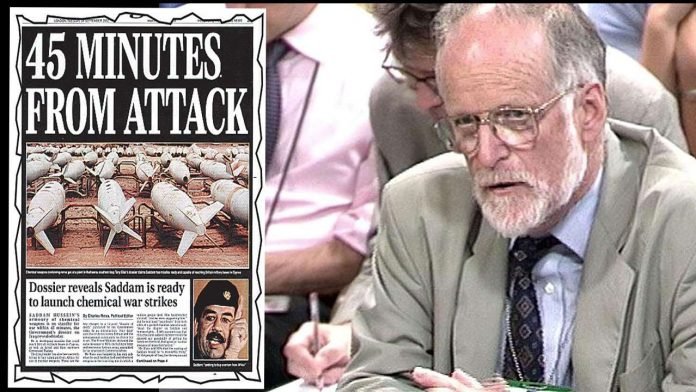The Mysterious Death of Dr David Kelly
In the dark corridors of political intrigue and government deceit, few stories captivate the public’s imagination and fuel conspiracy theories quite like the enigmatic demise of Dr David Kelly.
A renowned weapons expert who fearlessly testified before a select committee, unequivocally proclaiming, “Iraq had no biological weapons,” only to meet a tragic end just two days later.
The mysterious circumstances surrounding his death have left a trail of unanswered questions, fostering a climate of suspicion and raising doubts about the true nature of his untimely demise.
In this article, we delve into the perplexing case of Dr David Kelly, exploring the events leading up to his fateful testimony, the subsequent unravelling of his life, and the lingering shadows that continue to haunt this controversial chapter in modern history.
Join us as we navigate through the labyrinth of secrecy, uncovering the layers of intrigue and examining the lasting impact of this unsettling tragedy.
Dr David Kelly testified Iraq had no WMD two days later he was dead
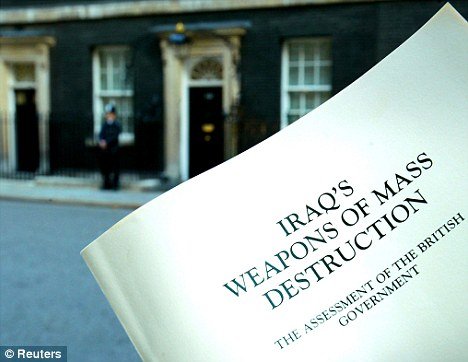
In the lead-up to the Iraq War, Dr David Kelly testified that Iraq had no biological weapons. Two days later, he was dead. The suspicious circumstances surrounding his death highlight the grave consequences of speaking truth to power.
This is the sad tale of actions and consequences that led not only to the death of Dr David Kelly but the deaths of hundreds of thousands. Victims of government lies and press manipulation.
It started with a dossier… Iraq – Its Infrastructure of Concealment, Deception and Intimidation, a file more commonly known as the Iraq Dossier.
The February Dossier or the Dodgy Dossier as it became known was a 2003 briefing document for prime minister Tony Blair’s Labour Party government.
It was issued to journalists on 3 February 2003 by Alastair Campbell, Blair’s Director of Communications and Strategy, and concerned Iraq and weapons of mass destruction. Along with the earlier September Dossier, these documents were ultimately used by the British government to justify its involvement in the invasion of Iraq in 2003.
Back in 2002, Tony Blair’s Labour Party government was looking for valid reasons to join with the United States to invade Saddam Hussein’s Iraq.
On 24 September 2002, Tony Blair presented to Parliament a document entitled “Iraq’s Weapons of Mass Destruction”. The title, which was altered during drafting, would seem to imply that Iraq was known to have WMDs and not just the means to manufacture them.
The intelligence report stated that Iraq had weapons of mass destruction which posed a clear and present danger to the West. The report headlined the claim that Iraq could deploy and activate chemical weapons within 45 minutes of an order being given.

A foreword signed by Tony Blair claimed that “military planning allows for some of the WMDs to be ready within 45 minutes of an order to use them.” The inference drawn was that British troops stationed in Cyprus could be hit by an Iraqi WMD at only 45 minutes notice, which would have been untrue even if Iraq had possessed WMDs.
The 45 minutes claim was a major plank of the former Prime Minister’s argument to join the USA in an invasion of the country in 2003.
The dossier later made the case for the invasion of Iraq in 2003 and included government influence on some of the contents. The dossier is also controversial for having been “sexed up”—sensationalised—by Blair’s director of communications and strategy Alastair Campbell.
The term Dodgy Dossier was first coined by the online polemical magazine Spiked in relation to the September Dossier. The term was later employed by Channel 4 News when its reporter, Julian Rush, was made aware of Glen Rangwala’s discovery that much of the work in the Iraq Dossier had been plagiarised from various unattributed sources including a thesis produced by a student at California State University.
The most notable source was an article by then graduate student Ibrahim al-Marashi, entitled Iraq’s Security and Intelligence Network: A Guide and Analysis.
Whole sections of Marashi’s writings on “Saddam’s Special Security Organisation” were repeated verbatim including typographical errors, while certain amendments were made to strengthen the tone of the alleged findings (e.g., “monitoring foreign embassies in Iraq” became “spying on foreign embassies in Iraq”, and “aiding opposition groups in hostile regimes” became “supporting terrorist organisations in hostile regimes”).
In its opening paragraph, the briefing document claimed that it drew “upon a number of sources, including intelligence material”. Before the document’s release, it had been praised by Tony Blair and United States Secretary of State Colin Powell as further intelligence and quality research. The day after Channel 4’s exposé, Blair’s office issued a statement admitting that a mistake was made in not crediting its sources, but did not concede that the quality of the document’s text was affected.
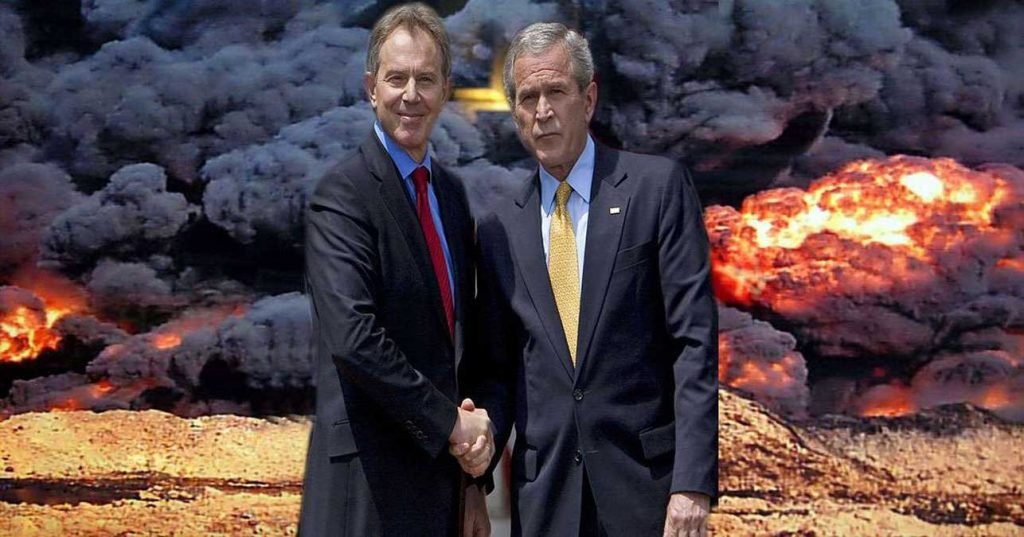
The claims contained in September and ‘Iraq’ Dossiers were called into question when weapons of mass destruction (WMD) were not found in Iraq, and the dossiers were encompassed by the House of Commons Foreign Affairs Select Committee inquiry.
The Committee subsequently reported that the sources should have been credited, and that the dossier should have been checked by ministers before being released.
The dossier had only been reviewed by a group of civil servants operating under Alastair Campbell. The committee stated that the publication was “almost wholly counter-productive” and in the event only served to undermine the credibility of the government’s case.
The controversy over the Iraq Dossier was mentioned frequently in the government’s conflict with the BBC over the claim in the September Dossier that Iraq could deploy biological weapons within 45 minutes of an order to do so, and the controversy surrounding the death of Dr David Kelly.
Andrew Gilligan, the BBC journalist who wrote a report which claimed that the September Dossier had been deliberately exaggerated, stated before the Hutton Inquiry that recalling the February Dossier had led him to file his report based on his interview with Dr Kelly without seeking confirmation from other sources.
Whether or not the September Dossier was inconsistent with the original intelligence, it was altered in ways that made it inconsistent with itself.
David Christopher Kelly CMG was a Welsh scientist and authority on biological warfare (BW). Kelly was the distinguished government scientist who hunted down weapons of mass destruction of the kind used by the Blair government to justify the 2003 war with Iraq. The problem was the Saddam Hussein regime did not have them.
In July 2003 he had an off-the-record conversation with Andrew Gilligan, a BBC journalist; during their discussion, they talked about the 2002 dossier on Iraqi weapons of mass destruction, which stated that some of Iraq’s chemical and biological weapons were deployable within 45 minutes.
When Gilligan reported this on BBC Radio 4’s Today programme, he stated that the ’45 minute’ claim was included at the insistence of Alastair Campbell, the Downing Street Director of Communications—something Kelly denied.
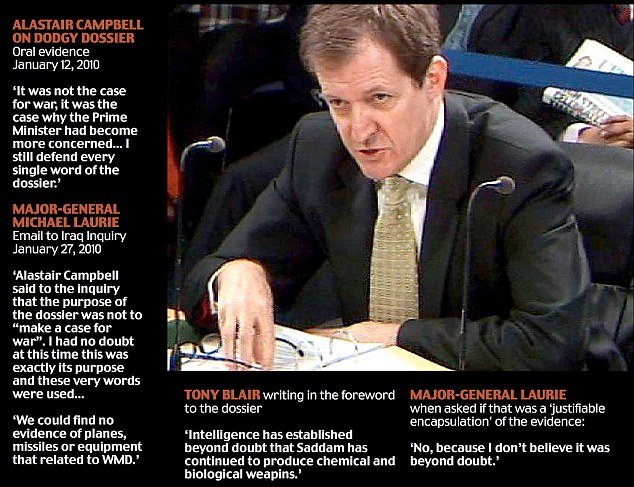
Despite the denial from the government, on 1 June—the day after Kelly and Watts had spoken on the telephone—Gilligan wrote an article for The Mail on Sunday in which he specifically named Campbell; it was titled: “I asked my intelligence source why Blair misled us all over Saddam’s weapons. His reply? One word … CAMPBELL”
Alastair Campbell, was incandescent with rage when he learned of the Gilligan broadcast with its very serious implications for his boss the prime minister.
The government complained to the BBC about the claim, but they refused to recant on the claim; political tumult between Downing Street and the BBC developed. Kelly informed his line managers in the MoD that he may have been the source, but did not think he was the only one, as Gilligan had reported points he had not mentioned.
Kelly’s name became known to the media, and he was called to appear on 15 July before the parliamentary Intelligence and Security and Foreign Affairs Select Committees.
Two days later Kelly was found dead near his home.
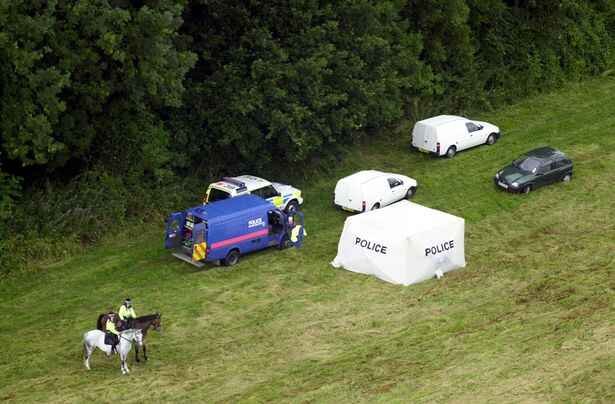
It’s now nearly 20 years since Dr David Kelly was found dead in an Oxfordshire wood in one of the darkest episodes of Tony Blair’s time as Prime Minister.
The official explanation was that the distinguished weapons expert had taken his own life by overdosing on painkillers and cutting his left wrist, devastated after being unmasked as the source of the BBC’s claim that the Government had ‘sexed up’ the case for the Iraq War.
A BBC Today programme report claimed the government had embellished or “sexed up” the intelligence it presented to the public in 2003 to justify the war.
A furore erupted between the government, led by chief spin doctor Alastair Campbell, and the BBC, which refused to back down, having failed to spot the flaws in its reporting.
Kelly was outed as the BBC’s source, felt publicly humiliated and was reprimanded by his bosses. A proud man felt let down by them, and that his reputation built up over a lifetime was being irreparably tarnished.
In the days before that final walk Kelly’s family said they had never seen him so low. As news of his death spread, the normally self-assured Blair seemed stunned when a reporter cried: “Do you have blood on your hands?”
Kelly’s death led not to an inquest, but a public inquiry by Lord Hutton, which brought a rare glimpse into the secret worlds of Whitehall, British intelligence, the low arts of high politics, and the workings of the BBC.
Its conclusion largely absolved the government of blame, to the surprise of many observers.
Its criticism of the BBC led to the demise at the corporation of then chairman Gavyn Davies, correspondent Andrew Gilligan and director general Greg Dyke, who in 2013 a decade on said history has proven the broadcaster was right: “Ten years on, it is very difficult to find anyone who believes they did not ‘sex up’ that document.”
Hutton Inquiry
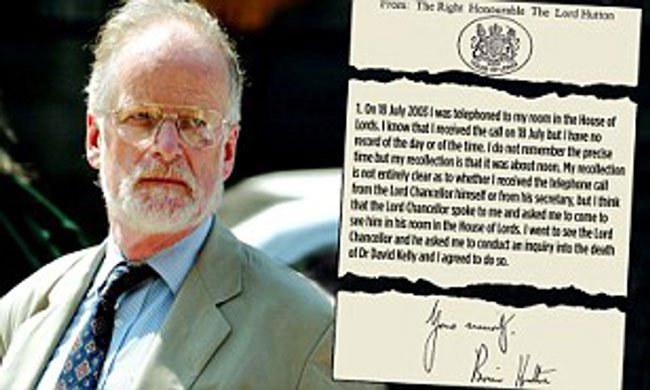
Since Dr Kelly’s death in 2003, time has done nothing to dispel the cloud of suspicion that hangs over the episode. The troubling questions surrounding it have only increased as the years have passed.
Immediately after the reports of Dr Kelly’s death on 17 July 2003, less than an hour after Dr Kelly’s body was discovered – and before it had been formally identified or seen by a medical professional who could estimate a cause of death – Blair instructed his Lord Chancellor and an old friend from university, Charles Falconer, to set up a public inquiry into the circumstances surrounding his death.
Tony Blair appointed a law lord, Baron Hutton of Bresagh, to head an inquiry into his death. His 328-page report, published on 28 January 2004, it concluded that Andrew Gilligan’s allegations were “unfounded”, and caused the resignations of the chairman and the director general of the BBC, Gavyn Davies and Greg Dyke.
The establishment of the Hutton Inquiry ensured that the microscopic investigation of the death which would have happened during a coroner’s inquest never took place. Whereas the coroner would have had formal powers, the Hutton Inquiry had none.
Witnesses could not be compelled to attend, no evidence was given on oath, and Hutton had total control over who would appear and what documents could be disclosed.
The result, in the eyes of many, was a whitewash.
In his report, Hutton concluded that Dr Kelly had taken his life and that nobody could have anticipated this. He stated that ‘the principal cause of death was bleeding from incised wounds to his left wrist which Dr Kelly had inflicted on himself with the knife found beside his body’.
He said that Dr Kelly had coronary heart disease, that there were co-proxamol painkillers in his blood, and that these things might have helped bring about death ‘more certainly and more rapidly’.
Hutton then added: ‘I am further satisfied that no other person was involved in the death of Dr Kelly and that Dr Kelly was not suffering from any significant mental illness at the time he took his own life.’
Debate still surrounds Hutton’s conclusion that Kelly committed suicide. The inquiry found that Kelly died after cutting an artery, had taken an overdose of painkillers and had heart disease which left his arteries “significantly narrowed”. Thus, said experts, less blood loss may have killed the scientist than that needed to kill a healthy man.

Among those who called for an inquest or have doubts it was a suicide are former Tory leader Michael Howard, and Liberal Democrat minister Norman Baker, who wrote a book saying Kelly was most likely murdered.
Lord Hutton has denied that his report was a ‘whitewash’.
The claims that Britain’s senior expert on germ warfare had been killed by “dark actors” – or even by members of our own security services – were supposed to have been laid to rest by the 2004 Hutton Inquiry into Dr Kelly’s death. It concluded that the scientist had died from a haemorrhage caused by a severed wrist artery with two contributory factors: poisoning by 29 co-proxamol pain-killing tablets and undiagnosed coronary artery atherosclerosis.
It was a suicide verdict some people did not accept. Some of those sceptics were wild conspiracy theorists, but other more respectable voices have raised questions.
In January 2010, Lord Hutton ordered that all files relating to Dr Kelly’s post-mortem – including the autopsy report, unpublished medical and scientific records and photographs of the body – should remain secret for 70 years. The judge suggested that his intention was to avoid further distress to the family. But the move fuelled the conviction of sceptics that something was being hidden.
A rash of disbelieving newspaper articles, predominantly in the Daily Mail, but also picked up by The Times, have ratcheted up pressure on the Government to re-open investigations into David Kelly’s death.
In June 2010, Richard Spertzel, the former head of the UN Biological Section, who worked with Dr Kelly in Iraq in the 1990s, wrote to the Attorney General, Dominic Grieve, claiming that Dr Kelly had been told he was on a “hitlist” in the final years of his life.
Then Graham Coe, the detective who found Dr Kelly’s body, claimed in an interview (with the Mail on Sunday) that there was less blood found at the scene than was recorded by the Hutton inquiry.
He also revealed that, contrary to the evidence he had given Hutton, a third man (a member of the security services, in the eyes of the conspiracy theorists) was with him and his partner when they found the body. (Coe did conclude: “In my view, he [Kelly] took his own life. Only he will know why he did that.”)
In August 2010, nine doctors wrote an open letter calling for “a detailed investigation of all the medical circumstances” and alleging that the Hutton Inquiry’s procedures and conclusions were “unsatisfactory”. The doctors wrote that it was “extremely unlikely that the primary cause of death would or could have been haemorrhage from a severed ulnar artery in one wrist without any evidence of a blood-clotting deficiency.”
They called for a “proper inquest”, and were supported by a retired pathologist, Jennifer Dyson, who insisted that had there been a normal inquest, a coroner would probably have recorded an open verdict in the absence of absolute proof that suicide was intended.
Then the former Conservative Party leader Lord Howard called for a full inquest into Dr Kelly’s death, and the Justice Secretary Ken Clarke – the only minister who could overturn Lord Hutton’s decision to impose a 70-year secrecy order – met the Attorney General to discuss the issue.
Hutton has kept silent since his report, breaking it only to write a letter denouncing the conspiracy theorists. Hutton’s conclusion is supported by the available facts and experts: “At no time … was there any suggestion from any counsel for the interested parties or in any of the extensive media coverage that any of the police officers engaged in investigating Dr Kelly’s death or any of the medical or scientific witnesses was involved in any sort of cover-up or plot to make a murder appear like a suicide.”
Dyke claimed that: “Some of Dr Kelly’s wider family don’t believe it’s suicide.”
A group of doctors say Hutton’s findings should be discarded and a new inquest held. Dr Stephen Frost said: “We have lots of evidence … No coroner in the land would reach a verdict of suicide as Lord Hutton did.”
The doctors had mounted a long-running campaign for the inquest into Dr Kelly’s death to be re-opened, arguing that Lord Hutton’s suicide verdict was unsafe.
They complained that Lord Hutton spent only half a day of his 24-day inquiry considering the cause of death and claim there was insufficient evidence to prove beyond reasonable doubt that Dr Kelly killed himself.
“No coroner in the land would have reached a suicide verdict on the evidence which Lord Hutton heard,” they say.
They believe Dr Kelly’s wrist wounds were not likely to be life-threatening, making the official cause of death – a haemorrhage – “extremely unlikely”.
They say unanswered questions surrounding the death remain, including:
- why no fingerprints were found on the knife apparently used to slit his wrist
- how Dr Kelly obtained a packet of coproxamol painkillers
- why his blood and stomach contained only a non-toxic dose of the drug
- why he was not spotted by a police helicopter with thermal imaging cameras which flew over the wood where his body was later found
- whether he intended to kill himself
There was continued debate over the manner of Kelly’s death, and the case was reviewed between 2010 and 2011 by Dominic Grieve, the Attorney General; he concluded that there was “overwhelmingly strong” evidence that Kelly committed suicide.
The attorney general argued that Lord Hutton’s inquiry had been “tantamount to an inquest”.
Following the government’s decision, the doctors who had petitioned Mr Grieve called for his resignation.
Campaign leader Dr Stephen Frost said: “The continuing cover-up of the truth of what happened is a national disgrace and should be of concern to all British citizens.”
Successive governments have refused to allow a full coroner’s inquest to be held, fuelling the sense of a cover-up.
In October 2017, Dr Kelly’s family secretly exhumed his body and reportedly cremated it.
Support Independent Journalism Today
Our unwavering dedication is to provide you with unbiased news, diverse perspectives, and insightful opinions. We're on a mission to ensure that those in positions of power are held accountable for their actions, but we can't do it alone. Labour Heartlands is primarily funded by me, Paul Knaggs, and by the generous contributions of readers like you. Your donations keep us going and help us uphold the principles of independent journalism. Join us in our quest for truth, transparency, and accountability – donate today and be a part of our mission!
Like everyone else, we're facing challenges, and we need your help to stay online and continue providing crucial journalism. Every contribution, no matter how small, goes a long way in helping us thrive. By becoming one of our donors, you become a vital part of our mission to uncover the truth and uphold the values of democracy.
While we maintain our independence from political affiliations, we stand united against corruption, injustice, and the erosion of free speech, truth, and democracy. We believe in the power of accurate information in a democracy, and we consider facts non-negotiable.
Your support, no matter the amount, can make a significant impact. Together, we can make a difference and continue our journey toward a more informed and just society.
Thank you for supporting Labour Heartlands
